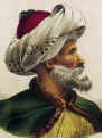محمود درملي پاشا
محمود پاشا، المكنـّى درملي Dramalı (باليونانية: Μαχμούτ πασάς Δράμαλης، دراما ح. 1780 - كورنث، 26 اكتوبر 1822) كان بايزاده،[1] وهو وزير عثماني، سردار أكرم،[2] پاشا ووالي لاريسا ودراما والمورة. وفي 1822، كـُلـِّف بإخماد الثورة اليونانية، إلا أنه هـُزم ولقي مصرعه بعد ذلك بقليل.
مطلع حياته وسيرته العملية
وُلد محمود پاشا في 1780 في دراما، وهي مصدر كنيته. He came from a distinguished family of Albanian origin: His maternal grandfather was Sultan Ahmed III by his mother ; Zeynep Sultan, thus his paternal grandfather Husain Agha was a چورباجي الإنكشارية وحاكم قولة، while his father Halil Mehmed Bey was the "Silahtarağası" of Sultan Selim III, after commanded an Albanian regiment في مصر ضد ناپليون. وكان حسين أغا أيضاً خال محمد علي پاشا، making Mahmud the latter's nephew, and also a cousin of ابراهيم پاشا، who would also lead an expedition in Greece in 1825 – 1828.
نشأ محمود وتلقى تعليمه في قصر طوپقپو للسلطان سليم الثالث في اسطنبول. He participated in various campaigns throughout the Empire, rising to the post of Vizier and acquiring significant military skills. Enjoying the patronage of the والدة سلطان، he was eventually posted in his home province of Drama, succeeding his father Halil as governor. In 1820 he was پاشا لاريسا and participated in the army of خورشيد پاشا that was operating against the rebel علي پاشا من تپلنلي من يانينا.[3]
In the summer 1821, as the Greek uprising began, he crushed the first rebellions by Greeks in the Agrafa and Mount Pelion regions,[4] and after the disgrace and suicide of Hursid, took over as Mora Valisi, with the task of destroying the Greek revolt in its heart، المورة. He assembled a well-equipped army of well over 20,000 men, a huge force by Balkan standards, and the largest Ottoman army to enter Greece since the الغزو العثماني للمورة in 1715. These comprised among others ca. 8,000 cavalry, predominantly from Macedonia and Thrace, and several thousand veterans of the الحملة ضد علي پاشا.[5]
حملة المورة
At the head of his army, Dramali set off from Larissa in late June 1822, and swept practically unmolested through eastern Greece: his forces marched unopposed through Boeotia, where they razed Thebes, and Attica, where however he did not attempt to retake the Acropolis, which had only shortly before surrendered to the Greeks.
He passed through the defiles of the Megaris unmolested, and entered the Peloponnese. He arrived at Corinth in mid-July, and found the strong fort of Acrocorinth abandoned without a fight by its Greek garrison. He wed the widow of the fort's murdered former commander, Kiamil Bey, and was joined by Yusuf Pasha of Patras, who advised him to remain in Corinth, using it as a base, and to build up strong naval forces in the Corinthian Gulf and isolate the Morea, before advancing on Tripoli. But Dramali, by now utterly self-confident by the Greeks' apparent reluctance to oppose him, decided to march at once to the south, towards the Argolis.
His advance caused a panic among the Greeks: the siege of Nafplio was abandoned just as the garrison was preparing to surrender, and the provisional government fled Argos and embarked on ships for safety. However, on arriving at Argos on 11 July, Dramali made two critical mistakes: he did not secure his main supply and retreat route through the Dervenakia Pass, and ignored the fact that the absence of the Ottoman Navy meant that he could not be supplied by sea. Instead, he focused on taking the town's fort, stubbornly defended by a 700-strong Greek garrison under Demetrios Ypsilantis, which held out for twelve vital days, before breaking through the besiegers' lines and escaping. During that time, the Greeks, under Theodoros Kolokotronis, rallied their forces, and occupied the surrounding hills and defiles, including the Dervenakia. The Greeks systematically looted the villages of the Argolic plain, even setting fire to the crops and damaging the springs, so as to starve the Turkish army.
Trapped in the sweltering summer heat of the Argolic plain, without water and food, Dramali was forced to plan withdrawing back to Corinth. On 26 July he sent out his cavalry as an advance guard towards the Dervenakia pass. But the Greeks were expecting the move, and had taken up positions there. The resulting battle was a complete Greek victory, with few Ottomans managing to escape. Finally, two days later, Dramali set out with his main army. Although he and his bodyguard managed to pass, the majority of his army, as well as the treasury and most baggage and equipment, were trapped in the pass and massacred. The result of Dramali's campaign, which had started so well, was a complete disaster: out of more than 30,000 soldiers, only 6,000 returned to Corinth, where Dramali died of high fever.
Dramali's defeat saved the Greek uprising from an early failure. The extent of the defeat was such that it entered into the modern Greek language as a proverb: "η νίλα του Δράμαλη" (Dramali's fiasco), which is used to denote a complete disaster.
الهامش والمراجع
المصادر
- Finlay, George (1861). History of the Greek Revolution. London: William Blackwood and Sons.
- Zenakos, Augoustinos (2003-03-02). "Η Μάχη στα Δερβενάκια 1822 - Οι Αντίπαλοι" (in Greek). To Vima. Retrieved 2008-08-24.
{{cite web}}: CS1 maint: unrecognized language (link)
- Articles containing Greek-language text
- Articles with hatnote templates targeting a nonexistent page
- مواليد عقد 1780
- وفيات 1822
- People from Drama Prefecture
- Muhammad Ali Dynasty
- Ottoman military personnel
- باشوات
- موظفون عموميون عثمانيون
- عسكريون عثمانيون في حرب الاستقلال اليونانية
- 19th-century Ottoman people
- ألبان عثمانيون
